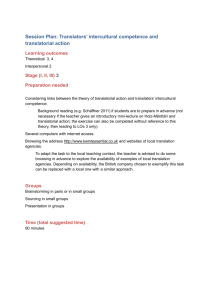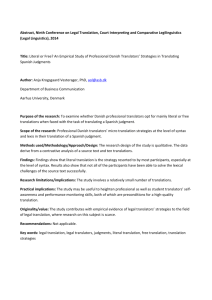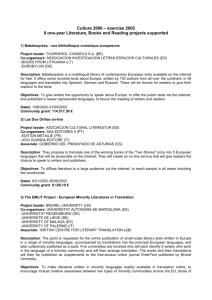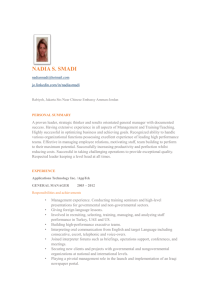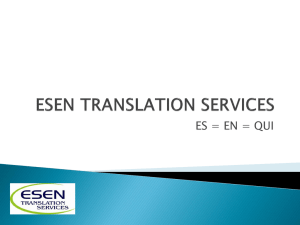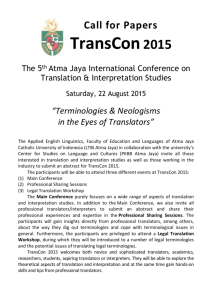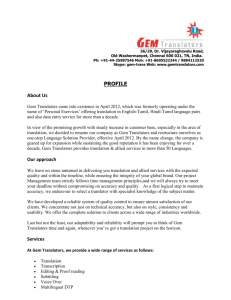Sociologies of translation
advertisement
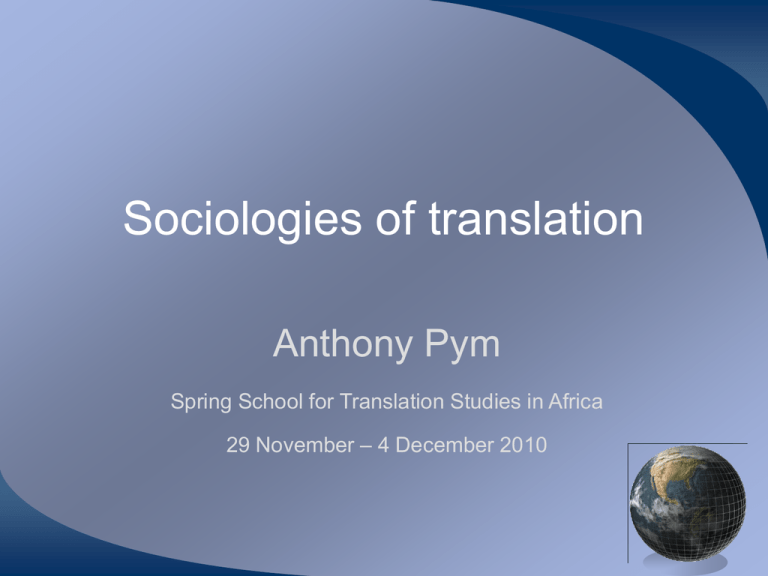
Sociologies of translation Anthony Pym Spring School for Translation Studies in Africa 29 November – 4 December 2010 How many turns? “Cultural turn”: Lefevere and Bassnett (1990) “Return to ethics” (Pym 2001) “Performative turn” (Hardwick 2003) “Creative turn” (Perteghella and Loffredo 2006) “Linguistic re-turn” (Vandeweghe 2007) “social /sociological turn” Wolf (2006) “Technological turn”… “Professional turn”… How many sociologies? Cultural pragmatics of texts (Nida; equivalence paradigm) Role of translations in cultural systems (Russian Formalists, Prague School, Even-Zohar) Role of translators and editors in publishing systems (Bourdieu) Social explanation of translation flows (Heilbron, Sapiro) Norms and professionalism of translators (Tel Aviv School) How many sociologies? Intercultural location of translators (Pym) Habitus of translators (Meylaerts, Tel Aviv) Agency of translators (Koskinen) Movement and transformation of ideas between social locations (Callon, Latour, Law) Movement and transformation of ideas in order to serve social causes (not professions) (Wolf) The problem of agency If the actions of translators are determined by their social location, then how can they bring about social change? Polysystem theory: they can’t really Habitus theory: they can’t really (habitus dissolves the problem) Actor-network theory: translation is an act of power Even-Zohar on agency “the ‘normal’ position assumed by translated literature tends to be the peripheral one” (1978: 50) “intellectual energy” is necessary for a system, even if it changes nothing Simeoni on habitus Hypothesis: “Translators, not unlike the scribes of ancient or premodern civilizations, have always occupied subservient positions among the dominant professions of the cultural sphere.” “…this attitude of assumed subservience is not innate. It must have a history, both individual and at group level.” “…the same practice can be observed today, within the ranks of professional translators and their organizations, this time in references ad nauseam to the authority of the ‘client.’” ANT “translation” By “translation” we mean the set of negotiations, intrigues, acts of persuasion, calculations, acts of violence by which an actor or a force accords or allows itself to be accorded the authority to speak or to act in the name of another actor or force: “your interests are our interests,” “do what I want,” “you cannot succeed without me.” As soon as an actor says “we,” he or she translates other actors into a single aspiration [volonté] of which she or he becomes the master or spokesperson. (Callon and Latour 1981/2006: 12–13; our translation) Intercultural theory Translators are never wholly in a society. A border: © Intercultural Studies Group Intercultural theory Professional intercultures bring together groups of intermediaries Group formation is based on diversity of provenance and complementarity of skills. The more technical the communication, the more agency in the interculture. Intercultures are short-lived. Bourdieu’s capitals Economic Money and material resources Cultural Skills and competencies (degrees and diplomas) Symbolic Social prestige (perhaps degrees and diplomas) Social Who you know Bourdieu’s publishers: © Intercultural Studies Group Research: Michaela Wolf on feminist publishers Szu-Wen Cindy Kung on David Wang and Columbia University Press The first Latin translators of the Qur’an Henri Albert, the main French translator of Nietzsche © Intercultural Studies Group Agency resolved by… Determination by multiple systems Movement between different kinds of economies So what is to be done? And who should do it? For or against the profession? Research on expertise, competence, habitus and intercultures assumes professionalization: Common Sense Advisory (2008): 700,000? Process studies: 234? New technologies allow mass voluntary translation (crowd-sourcing, collaborative translation, citizen translation, community translation, TC3. The profession reacts… Ordre des Traducteurs, terminologues et interprètes agréés du Québec Par réserve inadéquate du titre, nous entendons le fait que n’importe qui au Québec peut se proclamer traducteur, terminologue ou interprète, à condition de ne pas accoler au titre le qualificatif « agréé ». Cela crée une situation de doubles appellations, source d’ambiguïté dans le public, avec les risques que cela comporte. (2009: 4) Ordre des Traducteurs, terminologues et interprètes agréés du Québec ***Mise en garde*** Comme le reconnaissent les concepteurs de logiciels de traduction automatique eux-mêmes, nous sommes encore loin du jour où ces outils pourront produire une traduction de qualité comparable à celle des traductions produites par les êtres humains. Dans le cadre de son mandat de protection du public, l'OTTIAQ vous recommande donc la plus grande prudence et vous invite à faire affaire avec un traducteur agréé pour tous vos besoins de traduction. Translation… Allows debate and comparison of different views of the issues at stake in society. Improves the general quality of life of immigrants. Improves the general quality of life of linguistic minorities. Informs consumers about products that have been produced in foreign languages. Enables exports to foreign markets Enables mass tourism by improving the experiences of tourists. And 130 more… Wolf’s social turn… Translation should serve social needs. So we need a concept wider than professional translation. And we need to look at more than translators.
